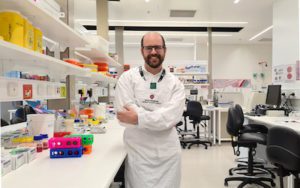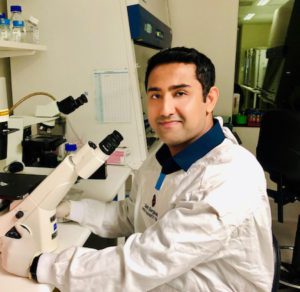PhD scholarships focused on improving outcomes for people with AML and MPN
The Leukaemia Foundation and the Haematology Society of Australia and New Zealand (HSANZ) are proud to announce the successful recipients of the 2021 round of PhD Scholarships Basit Salik and Dr Julian Grabek. The work of these recipients will help improve the understanding and treatment for acute myeloid leukaemia (AML) and myeloproliferative neoplasms (MPN).
The Leukaemia Foundation has been supporting Australian blood cancer research and the careers of promising scientists and clinicians for over 20 years. These PhD Scholarships, valued at $130,000 each, are part of the Leukaemia Foundation’s National Research Program which has invested more than $54.5 million into research since 2000. To date that funding has supported over 370 researchers across 290 research projects, through PhD scholarships and research grants, at over 50 hospitals, research institutes and universities.
Accelerating research and providing access to best practice treatments are two key research priorities of the Leukaemia Foundation and were identified as key priority areas in the State of the Nation: Blood Cancer in Australia report and recently released National Strategic Action Plan for Blood Cancer. These reports show us while significant gains have been made, it is projected that more than 186,000 Australians may die from blood cancers by 2035. These reports highlight that research has the potential to reduce blood cancers mortality rates and the associated economic costs but to do so will required increased and sustained investment in research. That is why the Leukaemia Foundation is committed to funding research the drives rapid advancements in treatments, diagnostics and novel therapies and gives Australians access to the latest treatments through clinical trials.
The Leukaemia Foundation thanks Brydens Lawyers and the Bourne Foundation for their generous contribution and support to the PhD Scholarship program.
Details of the research projects include:

Myeloproliferative neoplasms (MPN) are clonal haematological disorders of stem cells. These stem cells undergo a mutation that drives an overproduction of blood cells. Throughout the course of the disease the stem cells are driven by specific mutations (JAK2, CALR and MPL) but over time additional genetic mutations are acquired leading to progression of the disease to either secondary myelofibrosis and bone marrow failure or acute myeloid leukaemia. These outcomes have limited treatment options and have a poor prognosis.
High risk stem cells with the potential to develop into leukaemia can be identified early in the disease but are often a “needle in a haystack” when compared to the rest of the MPN stem cells. By using cutting edge single cell technology, the aim of Dr Grabek’s project is to separate each individual cell of the MPN stem cells. Through a combination of mutational analysis by novel nanopore technology and assessment of downstream gene signalling they will be able to determine the early stages of leukaemia development in these disorders. In future, it is hoped to establish which treatments have the potential to arrest these early changes and prevent transformation to leukaemia.

Basit Salik – Research scientist
Over the last 4 decades, chemotherapy-directed management of acute myeloid leukaemia (AML) patients has remained largely unchanged. While most patients achieve complete remission after chemotherapy, most patients with AML relapse and ultimately die of the disease.
A high relapse rate in AML suggests that current standard therapies do not target these highly self-renewing leukaemia cells and that immune subversion by the primary tumour leads to an ineffective anti-tumour response. Cancer cells including leukaemias can adapt to oncogenic and/or environmental stressors such as chemotherapy, hypoxia, and metabolic stress. Indeed, several stress-induced molecules augment pro-survival signalling and aggressiveness in cancer cells. By contrast, either by direct recognition of stress-induced molecules on cancer cells or by exposure to environmental stress factors, immune cells also undergo functional impairment.
Basit and his team will investigate biological pathways that regulate cancer cell-intrinsic adaptation/aggressiveness as well as immune dysfunction by utilising patient samples and mouse models of AML. The team is hopeful that this research will lead to improved therapeutics that can effectively inhibit leukaemia growth with the potential of harnessing anti-leukaemia immune responses for durable disease control.
This PhD scholarship is kindly supported by Brydens Lawyers.
The Leukaemia Foundation receives no ongoing government funding, and the National Research Program relies on the continued support of generous donations. Donations allow us to continue to invest in Australian blood cancer research and to support the next generation of researchers, driving this type of innovative research for better treatments, better care and ultimately a cure for blood cancer. To find out how to support the Leukaemia Foundation’s National Research Program call 1800 620 420.